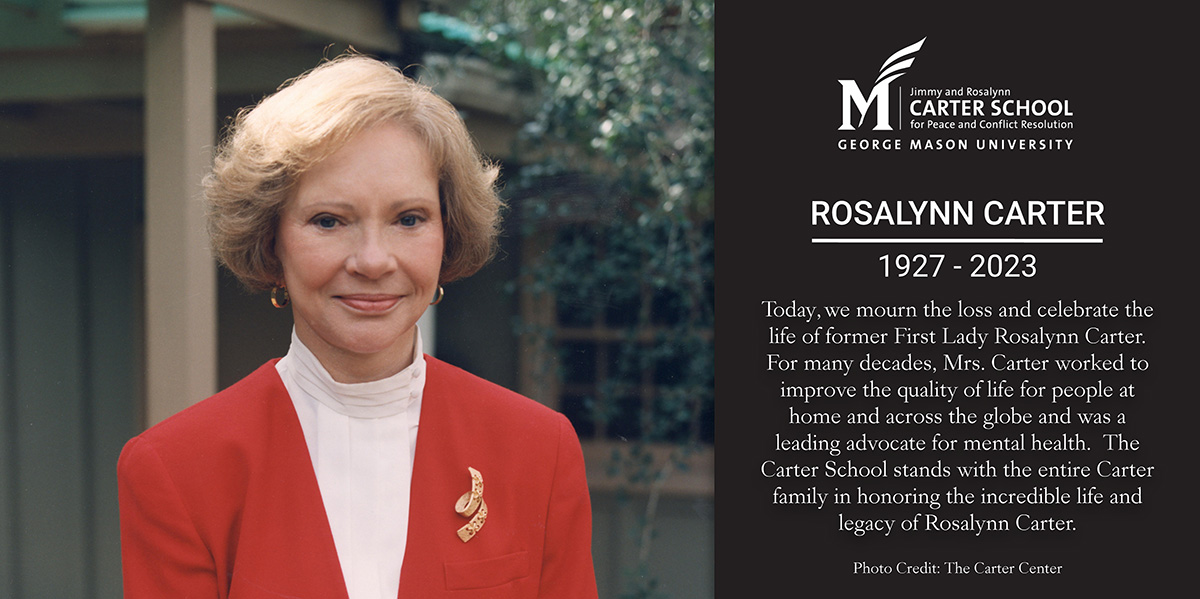The Jimmy and Rosalynn Carter School for Peace and Conflict Resolution offers this space to faculty, students, staff, and our wider community to share their memories and thoughts as we honor the Carters' legacy of conflict resolution, humanitarianism, and peacebuilding.
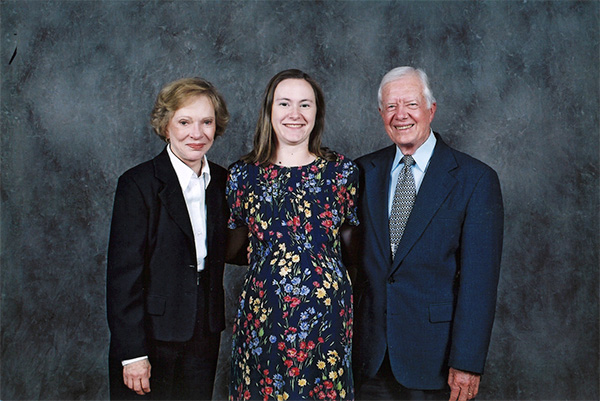
I am saddened to learn of Mrs. Carter’s passing. I send condolences to President Carter and the whole Carter family, as well as the many members of the broader Carter community who have worked with Mrs. Carter over the many years of her commitment to making the world a better place. I was grateful to have the opportunity to work with both President and Mrs. Carter at the Carter Center in Atlanta, and am honored to continue their legacy at the School that bears both their names, the Jimmy and Rosalynn Carter School for Peace and Conflict Resolution.
With all the discussions of Mrs. Carter’s professional accomplishments, I want to add also something more personal about her role as a professional woman. Mrs. Carter served as an inspiring role model for me as a young woman as I became a mother. She balanced her family roles and her professional roles with grace. She encouraged me in my early years of motherhood. Every time I saw her, she always asked about my child, and always delighted to see my young son as he grew, and also consistently inquired how I was doing with work and balancing everything, too. I am grateful for her leadership in so many areas.
- Susan Allen, Rice Chair and Director of Graduate Programs
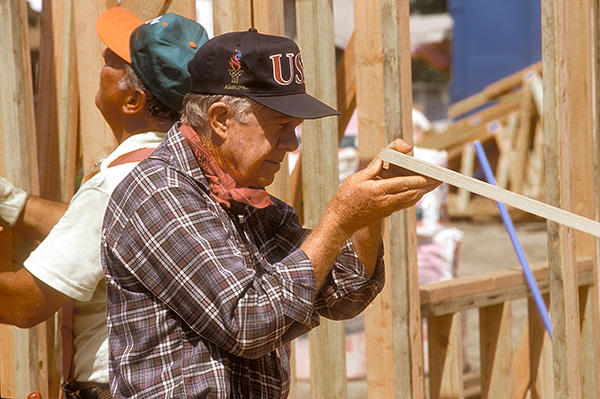
Jimmy Carter working with Habitat for Humanity.
"President Carter's work building homes for those in need and fighting diseases that are now nearly eradicated was an inspiration to me. I am proud to attend an institution named after him and his dear wife (the Jimmy and Rosalynn Carter School for Peace and Conflict Resolution). He is such a noble, humble peacemaker and I am grateful for all the work he has done."
- Kat Grayson
"I have a long-lasting impression of President Carter as a peacemaker. Growing up in a service-driven family, and one that values building, home and belonging, the humanitarian legacy of this leader was held in high regard. "Blessed are the peacemakers.". Now that I am exploring my own calling in conflict management, I have a new appreciation for his work in placing value on peacemaking, with a lens focused on the human experience of conflict and struggle, and building communities for a more resilient future."
- Clara Mattucci
"I had the pleasure of working with Jimmy and Rosalynn Carter and serving as a senior advisor for The Carter Center on two electoral observation missions in the aftermath of extremely violent and protracted conflicts – in 1997 in Liberia and in 2005 in Ethiopia. Both were difficult contexts with powerful actors who demonstrated questionable commitments to democracy and human rights. President Carter’s personal relationships with key leaders such as Charles Taylor in Liberia or Meles Zenawi in Ethiopia along with his access to US policy makers at the highest levels provided him with the leverage to advocate for peace and justice even in the most difficult circumstances."
- Terrence Lyons, Professor of Conflict Resolution
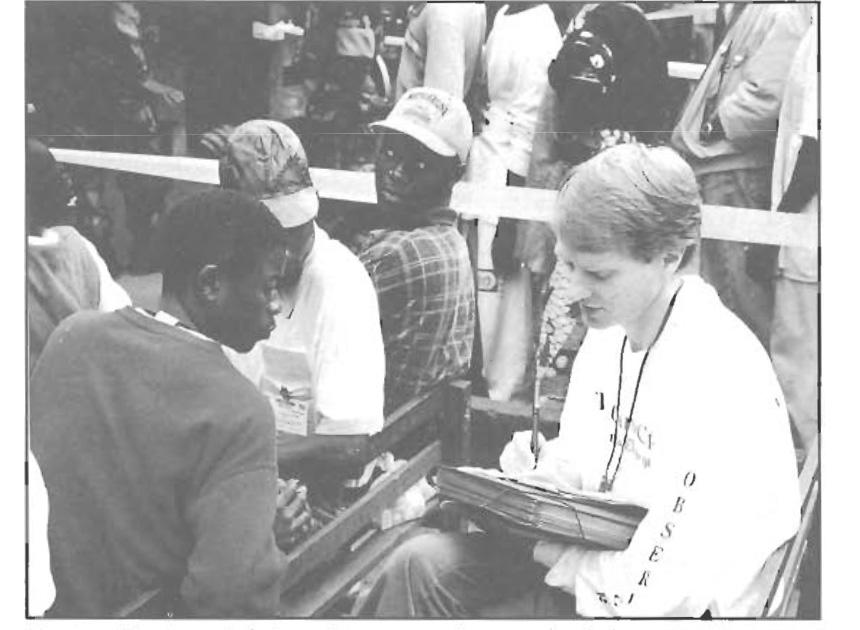
Terrence Lyons (right) discusses the electoral process with Liberian political party agents at a Monrovia polling site.
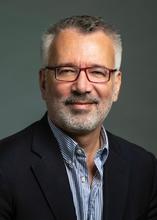
"In February 2020, we renamed our school after Jimmy and Rosalynn Carter as a tribute to their steadfast commitment to the peaceful resolution of conflict worldwide. As was then, the world faces both entrenched and emerging global threats and human security challenges; therefore, by becoming the Jimmy and Rosalynn Carter School for Peace and Conflict Resolution, we are committed to furthering both the research and practice of conflict resolution and in this effort, we take the Carters’ unwavering dedication to peace as our beacon and our guide. “The bond of our common humanity is stronger than the divisiveness of our fears and prejudices,” President Carter said during his Nobel Peace Prize Lecture. “God gives us the capacity for choice. We can choose to alleviate suffering. We can choose to work together for peace.” We are immensely proud of President Carter’s incredible conflict resolution legacy and thankful for all he has done for humanity."
- Alpaslan Özerdem, Dean, Carter School
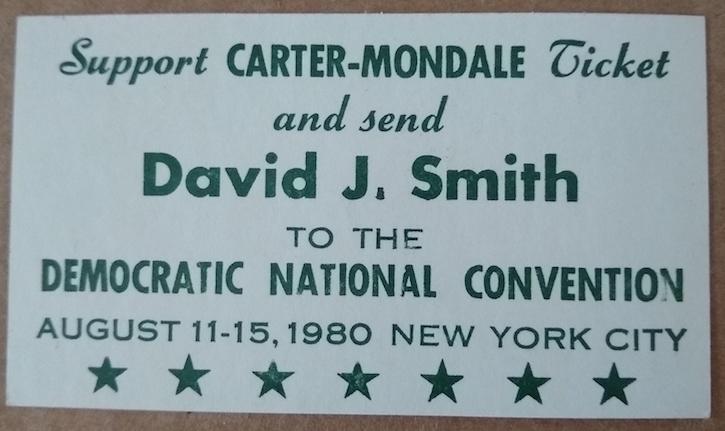
Photo: David J. Smith
"Carter struck me as a man of high principle and honesty, so much so that when he ran for re-election in 1980, I wanted to do more than just vote. I decided to run as a delegate to the Democratic National Convention (DNC), which was to be held in New York City in August that year, so that I could vote with the Maryland delegation to renominate him for a second term."
"I am grateful that I have be able to follow Jimmy Carter’s work and career as president, his founding of The Carter Center in Atlanta, Georgia (which I have visited), and his being awarded the Nobel Peace Prize. His work in fashioning the Camp David Agreement, among other initiatives, is an important testament to his commitment to peace."
- David J. Smith, JD, MS,
from David Smith: The significance of the Carter School and me
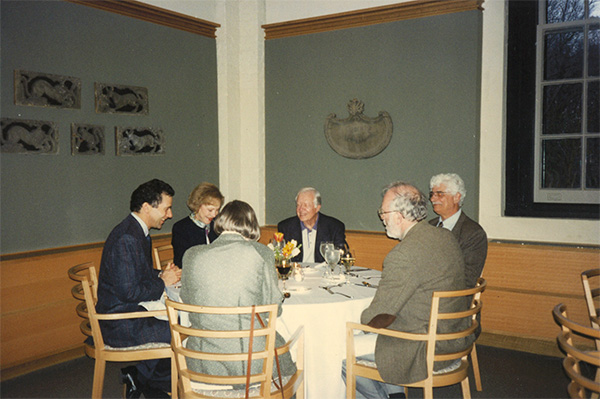
"I had the privilege of serving for a number of years on President Carter's academic advisory board in the 1990s. This in itself gave me an interesting insight into how the Carter Center and the President and Mrs Carter themselves operated at a practical level and how they managed to combine political mediation, election monitoring, humanitarian initiatives, and health improvement campaigns. However it was not until some colleagues and I - Wallace Warfield, Ambassador John McDonald, Hiskias Assefa - worked together with the Carter Center in Liberia that I began to realise how interlinked were the Center's values, and how much they reflected the genuinely cosmopolitan vision of the Center's founders.
Our project involved a major effort to bring together the various warring faction within Liberia and help them map out, agree and implement nonviolent methods for putting into effect the latest of the several peace agreements that had been intended to end the fighting and establish a working, coalition government for the country. Having participated in series of field visits, interactive workshops, liaisons with Nigerian peacekeeping forces, and the setting up of a cross faction monitoring committee, it gradually dawned on me that the only way that the Carter Center was being sufficiently trusted and hence permitted to carry out all this third party mediatory work was because it was already involved in Liberia, and had been for several years in the effort to eradicate guinea worm. In other words, we were riding on the back of the reputation that the Center activity and the President's visits had slowly built, and on the trust they had developed over the years of steady work and commitment - long term, patient peacebuilding, which enabled them to switch roles and at least be listened to when they spoke about the need for confidence building measures, for discussion and for an end to threats and violence.
That work gave all of us who were involved in the project, much to think about regarding what had then become known, among academic theorists as "the entry problem" for potential mediators."
- Christopher Mitchell, Professor Emeritus
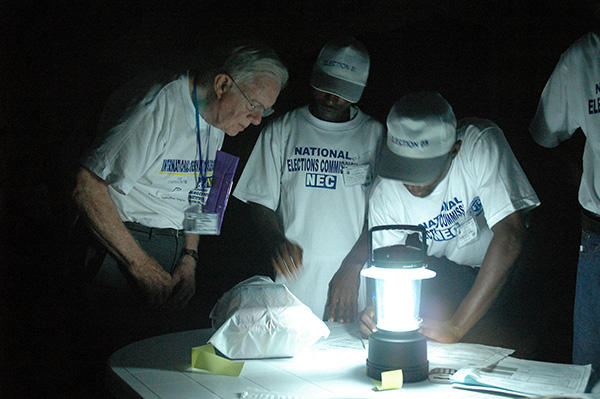
Jimmy Carter with Liberian election officials in 2005.
"I had the pleasure of serving as an election observer with the Carter Center in Liberia twice – in 1997 and in 2011. In 1997 both Jimmy and Rosalynn Carter came to Liberia during the elections. After the votes were cast and all the observers returned to Monrovia to report on their findings, Jimmy Carter sat at my table during dinner for all the staff and observers. He and I had a spirited and memorable discussion about what I saw in the Zorzor area of Lofa County where I was posted. I will never forget that experience."
- Agnieszka Paczynska, Associate Professor of Conflict Analysis and Resolution
"President Carter, I am so grateful to have had my country, my world served by you. You are my favorite president—not only were you were ahead of your time, but you practiced honesty and love and peace! You have continued to be a true, humble servant who kept on despite politics and the media. Many years ago, I read one of the books you wrote. Today, I am honored to be a Masters student in the Carter School at George Mason University. May your beautiful legacy live on through me and my classmates. Peace to you and yours. You have blessed us all. I will pray for you and your family."
- Donna Morgan
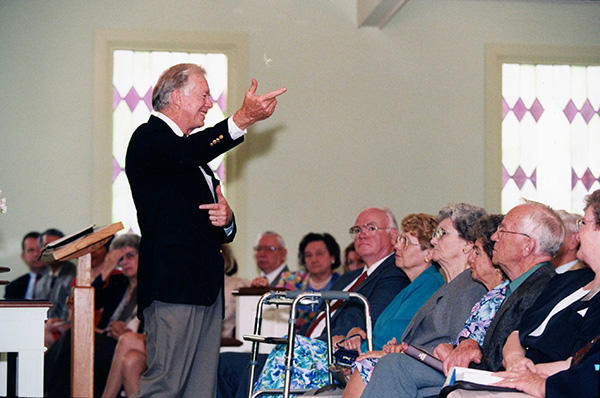
Photo courtesy of the Carter Center.
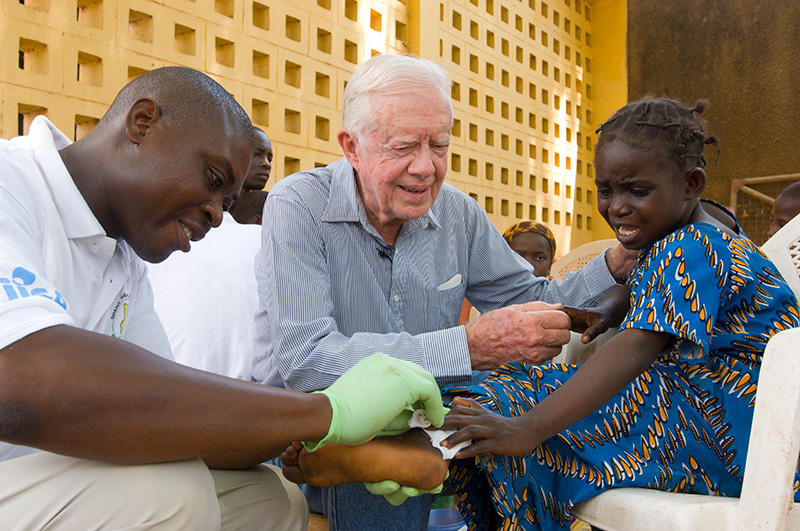
Jimmy Carter consoles a young patient having a worm removed from her body in Savelugu, Ghana, in February 2007. The Carter Center leads the international campaign to eradicate Guinea worm disease.
"It is an honor to work for a school that represents your unwavering dedication, courage, and commitment to humanity, conflict resolution, peace and justice. May your legacy continue to inspire lives forever."
- Dianka Curtis, Carter School Staff
"President Carter's commitment to sustainable peace and development in Africa, mostly through the Carter Center, has taken various forms across the African continent: for example, monitoring elections in Ghana, Kenya or Madagascar; supervising the implementation of peace agreements in Mali; supporting efforts to eradicate the Guinea worm disease in Cameroon, Chad and other countries; helping farmers in Burkina Faso improve food production; advancing transparency and accountability in the extractive industries in the D.R.Congo.
Besides his well-known mediation of the peace agreement negotiated between Israel and Egypt that led to the signing of the Camp David Accords in September 1978, President Carter intervened directly as a mediator in several African conflicts. He facilitated peace negotiations between the Ethiopian government and the Eritrean People's Liberation Front during 12 days in September 1989. He also successfully facilitated negotiations between top leaders for a regional peace initiative for Africa's Great Lakes Region in 1996.
It is fair to say that President Carter is a world citizen, a giant of our century, and a peacemaker who will always be remembered in Africa and whose commitment to the welfare of humanity beyond ethnic, religious, and racial differences will be celebrated by future generations. He did not only claim to be a Christian; he lived the Gospel by loving his human sisters and brothers beyond all artificial borders generated by these differences."
- Mathieu Bere, PhD '22
"In early 1996, President Carter hosted us in a pioneer meeting for interreligious dialogue actors (policy makers, faith-based leaders, and practitioners) in the Carter Center in Atlanta. The focus was on exploring ways to promote peace and dialogue among religions. The Dali Lama representative and many other representatives from different faith groups were gathered in that special meeting. During these, dealing with religion and peace in diplomacy was not fashionable or was rarely done. President Carter encouraged all of us to continue and explore the possibilities of promoting and developing strategies for faith-based peacemaking, especially in conflict areas like Tibet, Palestine, Sri Lanka, and Philippines."
- Mohammed Abu-Nimer, PhD '93
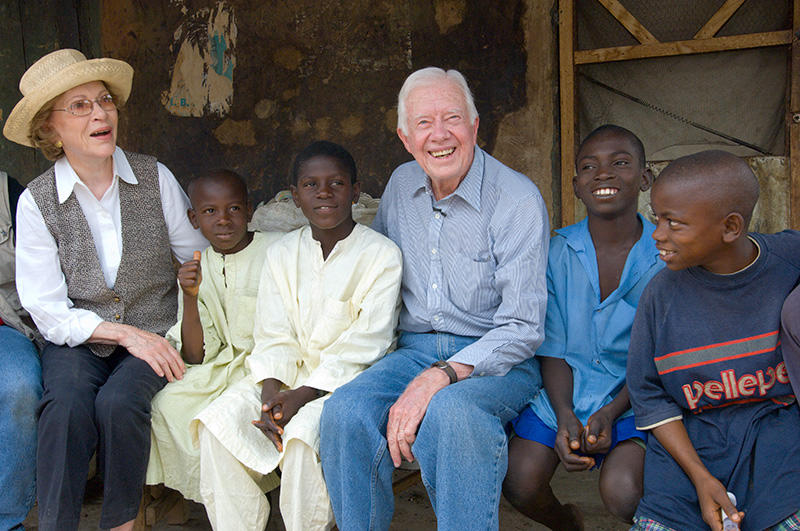
Former U.S. President Jimmy Carter and former First Lady Rosalynn Carter with young victims of schistosomiasis disease, during a trip to Nasarawa, Nigeria to assess Carter Center health programs in February 2007.
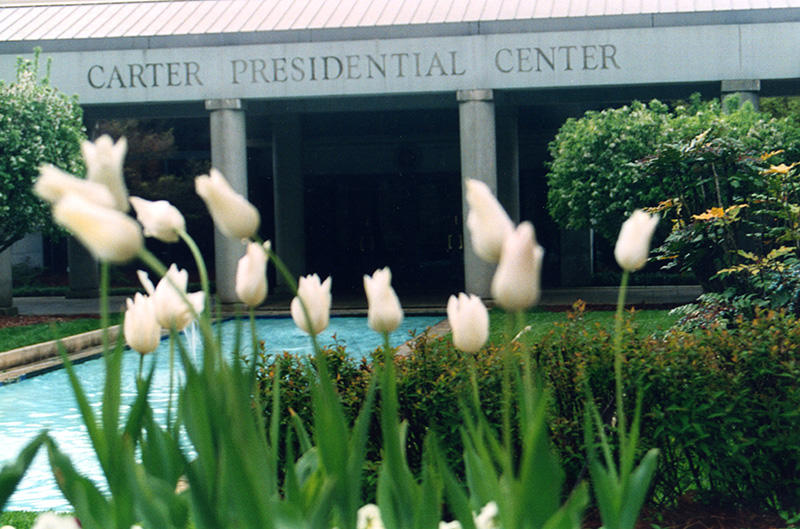
Entrance to the Jimmy Carter Library and Museum, which is located next to The Carter Center in a 35-acre wooded park just five minues from downtown Atlanta.
"When I was working on my Ph.D. in 2001, I was focusing on mediator sequencing strategies in large intractable conflicts. I sought to interview many of the top mediators in the world. I reached out to the Carter Center to see if President Carter would be willing to be interviewed and he agreed. When I flew down to meet him in Atlanta, I was admittedly pretty nervous. I still remember to this day when he came in the room and flashed that big, but humble smile, my nervousness faded away. We had a great conversation that really helped me in my research. He had a way, like many unique people, to make you feel very special in the moment."
- Joshua N. Weiss, PhD '02
"A delegation led by President Carter including Bishop Desmond Tutu and others came to Sudan around 2007-2008 in an attempt to stop a genocide that was taking place in Darfur which started in around 2005. I was the Country Representative of Save the Children USA at the time. Save the Children mounted one of its largest relief operations n Darfur. The Government of Sudan was extremely hostile to the US, but Save the Children has a resepctiveful track record in Sudan. I was asked to brief the delegation on the situation in Darfur. President Carter and his delegation made extra efforts to meet everybody and to advocate for ending the Conflict. His peace-making efforts were without borders including risk-taking like in the Case of Darfur. What is unique about him is that he was accepted by everybody including Sudan Government which severed relations with Washington, DC. He is the best that God gave to Humanity."
- Hussein Halane, MS '05
"President Carter's legacy of peace is one that encompasses the wholeness of humanity: peace is not only stopping violence but also accessing healthcare, addressing poverty, and caring for the environment."
- Dilafruz Khonikboyeva, MS '14, Carter School Advisory Board Member
"Somewhere in the late 1980s or early 1990s I was invited to an off the record debriefing after Jimmy Carter made a 14 country visit to heads of state in the Middle East. For 3 hours he talked steadily without interruption. What amazed me most is that in that entire time he did not make one disparaging remark about anyone of the 14 heads of state. He expressed the content of the conversation in light of needs, common goals, differences of perspective, areas where there could be conflicting needs, but consistently he spoke respectfully of each of those leaders and appealed their human dignity. What are role model for us in the CCAR program."
- Adrienne Kaufmann, PhD '99

